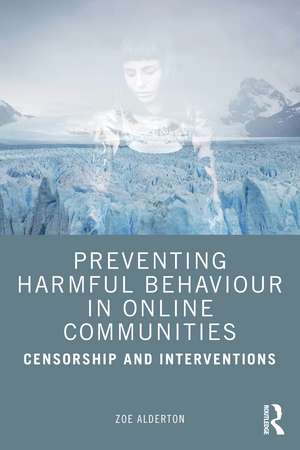Preventing Harmful Behaviour in Online Communities: Censorship and Interventions
Autor Zoe Aldertonen Limba Engleză Paperback – 12 apr 2022
Preventing Harmful Behaviour in Online Communities explores the ethics and logistics of censoring problematic communications online that might encourage a person to engage in harmful behaviour.
Using an approach based on theories of digital rhetoric and close primary source analysis, Zoe Alderton draws on group dynamics research in relation to the way in which some online communities foster negative and destructive ideas, encouraging community members to engage in practices including self-harm, disordered eating, and suicide. This book offers insight into the dangerous gap between the clinical community and caregivers versus the pro-anorexia and pro-self-harm communities - allowing caregivers or medical professionals to understand hidden online communities young people in their care may be part of. It delves into the often-unanticipated needs of those who band together to resist the healthcare community, suggesting practical ways to address their concerns and encourage healing. Chapters investigate the alarming ease with which ideas of self-harm can infect people through personal contact, community unease, or even fiction and song and the potential of the internet to transmit self-harmful ideas across countries and even periods of time. The book also outlines the real nature of harm-based communities online, examining both their appeal and dangers, while also examining self-censorship and intervention methods for dealing with harmful content online.
Rather than pointing to punishment or censorship as best practice, the book offers constructive guidelines that outline a more holistic approach based on the validity of expressing negative mood and the creation of safe peer support networks, making it ideal reading for professionals protecting vulnerable people, as well as students and academics in psychology, mental health, and social care.
| Toate formatele și edițiile | Preț | Express |
|---|---|---|
| Paperback (1) | 323.23 lei 6-8 săpt. | |
| Taylor & Francis – 12 apr 2022 | 323.23 lei 6-8 săpt. | |
| Hardback (1) | 934.43 lei 3-5 săpt. | +18.73 lei 4-10 zile |
| Taylor & Francis – 12 apr 2022 | 934.43 lei 3-5 săpt. | +18.73 lei 4-10 zile |
Preț: 323.23 lei
Nou
61.86€ • 64.41$ • 52.28£
Carte tipărită la comandă
Livrare economică 11-25 martie
Specificații
ISBN-10: 0367647400
Pagini: 192
Ilustrații: 2 Tables, black and white; 2 Halftones, black and white; 2 Illustrations, black and white
Dimensiuni: 156 x 234 x 10 mm
Greutate: 0.45 kg
Ediția:1
Editura: Taylor & Francis
Colecția Routledge
Locul publicării:Oxford, United Kingdom
Public țintă
Postgraduate, Professional, Professional Reference, and Undergraduate AdvancedCuprins
Notă biografică
Descriere
Preventing Harmful Behaviour in Online Communities explores the ethics and logistics of censoring problematic communications online that might encourage a person to engage in harmful behaviour.
Using an approach based on theories of digital rhetoric and close primary source analysis, Zoe Alderton draws on group dynamics research in relation to the way in which some online communities foster negative and destructive ideas, encouraging community members to engage in practices including self-harm, disordered eating, and suicide. This book offers insight into the dangerous gap between the clinical community and caregivers versus the pro-anorexia and pro-self-harm communities - allowing caregivers or medical professionals to understand hidden online communities young people in their care may be part of. It delves into the often-unanticipated needs of those who band together to resist the healthcare community, suggesting practical ways to address their concerns and encourage healing. Chapters investigate the alarming ease with which ideas of self-harm can infect people through personal contact, community unease, or even fiction and song and the potential of the internet to transmit self-harmful ideas across countries and even periods of time. The book also outlines the real nature of harm-based communities online, examining both their appeal and dangers, while also examining self-censorship and intervention methods for dealing with harmful content online.
Rather than pointing to punishment or censorship as best practice, the book offers constructive guidelines that outline a more holistic approach based on the validity of expressing negative mood and the creation of safe peer support networks, making it ideal reading for professionals protecting vulnerable people, as well as students and academics in psychology, mental health, and social care.
